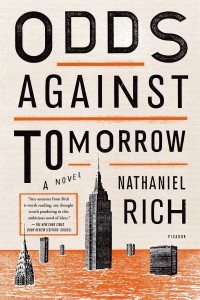Home » News » Nathaniel Rich at the Warren and Moore Environmental Series Dinner: Addressing modern anxieties through fiction
Nathaniel Rich at the Warren and Moore Environmental Series Dinner: Addressing modern anxieties through fiction
Posted by Douglas Fisher on Tuesday, October 27, 2015 in News.
This is a guest post by Alisha Newton. Alisha is a junior in Peabody College and the editor-in-chief of Orbis, a student-run publication on environmental issues.
Last month, I attended a dinner with author Nathaniel Rich to discuss his novel Odds Against Tomorrow, which has been hailed as the pioneering work of a new genre of literary fiction known as “climate fiction” (cli-fi for short). The dinner was hosted by Dr. Doug Fisher and his wife Patricia in Warren College, as part of the Warren & Moore Environmental Series (#enVU).
In writing Odds Against Tomorrow, Rich wanted to address the anxiety of the modern age in all of its forms. “Natural disasters, epidemics, terrorism, nuclear war, financial collapse — it’s all in there,” he says. It is the man-against-nature story of what happens to disaster-obsessed mathematician Mitchell Zukor when a Category-3 storm hits Manhattan.
We talked about the process of writing such a novel: “Research is how writers procrastinate,” joked Rich. In researching his novel, he read books about probability math and descriptions of natural disasters such as the Dust Bowl in the 30s. He read biographies of famous scientists and mathematicians to get inside their heads, and he studied flood scenarios of New York City.
At the dinner, we also discussed the role of fiction in the discourse on environmental change. “Ethical journalism is not allowed to be sensational, and yet many facts about the future are scary. People have this hunger to engage with their fears, and fiction is an outlet for that,” says Rich. During the Cold War, he says, people could read spy stories and other thrillers like 1984 by George Orwell, but in today’s world, people just go on the Internet and obsess over the seismic activity of the Yellowstone caldera.
It was an engaging discussion, but when you’re sitting in the well-furnished living room of a professor at a top-15 university, speaking to an acclaimed author over plates of vegan crab cakes and kale salad catered from Whole Foods, seltzer water in hand, it can be hard to grasp reality.
Reality is that in October 2012, “superstorm” Sandy ravaged the Eastern Seaboard from Florida to Maine, flooding New York City with a 13-foot storm surge and costing the United States $71.4 billion in damages. Reality is that this won’t be the last time a storm takes Sandy’s unusual path — the “left hook” directly into New Jersey — will be more common as mid-Atlantic ocean waters warm, according to some geoscientists.
In attendance at the dinner was Prof. Teresa Goddu of the English department. Goddu commented that in the novel, the storm incapacitates Wall Street, the symbol of our country’s economic strength. Yet as soon as the waters recede, the machine starts again, and the underlying issues are never resolved. There’s the sense that there will be another disaster, that this will happen again.
“How can we make peace with the uncertainty of the future?” asks Goddu. “To what extent do we freak out, and to what extent do we proceed with our lives?”
Personally, I believe neither route is the answer; it doesn’t help anyone to stay up nights fretting about the impacts of climate change, but on the other hand, we cannot proceed with business as usual. The problem of global climate change demands that we change our lifestyles and our national and international policies. Susceptible as they are to storm surges, the Manhattanites are on the right track: living smaller, living closer, and driving less, as part of overall increases in urban density, are key in reducing carbon emissions. Globally, we must take political action that looks out for the interests of vulnerable developing countries, especially those with large agricultural sectors. The future is highly uncertain, but like the protagonist in Rich’s acclaimed cli-fi novel, we can take action.
This post is a contribution by Alisha Newton, Class of 2017, and it does not necessarily represent the opinions of Vanderbilt University.


©2024 Vanderbilt University ·
Site Development: University Web Communications